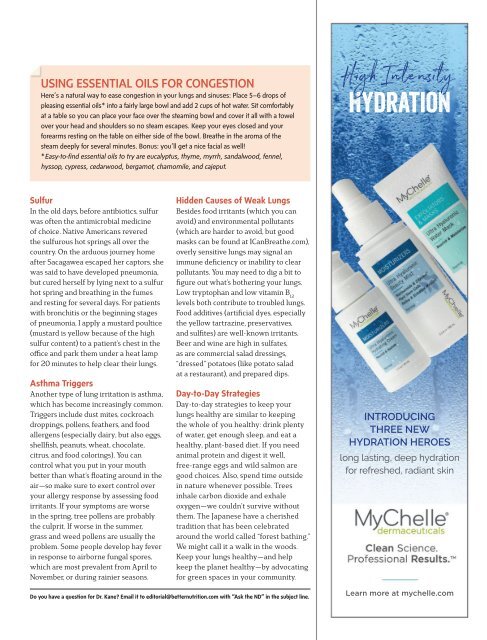You also want an ePaper? Increase the reach of your titles
YUMPU automatically turns print PDFs into web optimized ePapers that Google loves.
USING ESSENTIAL OILS FOR CONGESTION<br />
Here’s a natural way to ease congestion in your lungs and sinuses: Place 5–6 drops of<br />
pleasing essential oils* into a fairly large bowl and add 2 cups of hot water. Sit comfortably<br />
at a table so you can place your face over the steaming bowl and cover it all with a towel<br />
over your head and shoulders so no steam escapes. Keep your eyes closed and your<br />
forearms resting on the table on either side of the bowl. Breathe in the aroma of the<br />
steam deeply for several minutes. Bonus: you’ll get a nice facial as well!<br />
*Easy-to-find essential oils to try are eucalyptus, thyme, myrrh, sandalwood, fennel,<br />
hyssop, cypress, cedarwood, bergamot, chamomile, and cajeput.<br />
High Intensity.<br />
Hydration<br />
Sulfur<br />
In the old days, before antibiotics, sulfur<br />
was often the antimicrobial medicine<br />
of choice. Native Americans revered<br />
the sulfurous hot springs all over the<br />
country. On the arduous journey home<br />
after Sacagawea escaped her captors, she<br />
was said to have developed pneumonia,<br />
but cured herself by lying next to a sulfur<br />
hot spring and breathing in the fumes<br />
and resting for several days. For patients<br />
with bronchitis or the beginning stages<br />
of pneumonia, I apply a mustard poultice<br />
(mustard is yellow because of the high<br />
sulfur content) to a patient’s chest in the<br />
office and park them under a heat lamp<br />
for 20 minutes to help clear their lungs.<br />
Asthma Triggers<br />
Another type of lung irritation is asthma,<br />
which has become increasingly common.<br />
Triggers include dust mites, cockroach<br />
droppings, pollens, feathers, and food<br />
allergens (especially dairy, but also eggs,<br />
shellfish, peanuts, wheat, chocolate,<br />
citrus, and food colorings). You can<br />
control what you put in your mouth<br />
better than what’s floating around in the<br />
air—so make sure to exert control over<br />
your allergy response by assessing food<br />
irritants. If your symptoms are worse<br />
in the spring, tree pollens are probably<br />
the culprit. If worse in the summer,<br />
grass and weed pollens are usually the<br />
problem. Some people develop hay fever<br />
in response to airborne fungal spores,<br />
which are most prevalent from April to<br />
November, or during rainier seasons.<br />
Hidden Causes of Weak Lungs<br />
Besides food irritants (which you can<br />
avoid) and environmental pollutants<br />
(which are harder to avoid, but good<br />
masks can be found at ICanBreathe.com),<br />
overly sensitive lungs may signal an<br />
immune deficiency or inability to clear<br />
pollutants. You may need to dig a bit to<br />
figure out what’s bothering your lungs.<br />
Low tryptophan and low vitamin B 12<br />
levels both contribute to troubled lungs.<br />
Food additives (artificial dyes, especially<br />
the yellow tartrazine, preservatives,<br />
and sulfites) are well-known irritants.<br />
Beer and wine are high in sulfates,<br />
as are commercial salad dressings,<br />
“dressed” potatoes (like potato salad<br />
at a restaurant), and prepared dips.<br />
Day-to-Day Strategies<br />
Day-to-day strategies to keep your<br />
lungs healthy are similar to keeping<br />
the whole of you healthy: drink plenty<br />
of water, get enough sleep, and eat a<br />
healthy, plant-based diet. If you need<br />
animal protein and digest it well,<br />
free-range eggs and wild salmon are<br />
good choices. Also, spend time outside<br />
in nature whenever possible. Trees<br />
inhale carbon dioxide and exhale<br />
oxygen—we couldn’t survive without<br />
them. The Japanese have a cherished<br />
tradition that has been celebrated<br />
around the world called “forest bathing.”<br />
We might call it a walk in the woods.<br />
Keep your lungs healthy—and help<br />
keep the planet healthy—by advocating<br />
for green spaces in your community.<br />
INTRODUCING<br />
THREE NEW<br />
HYDRATION HEROES<br />
long lasting, deep hydration<br />
for refreshed, radiant skin<br />
Do you have a question for Dr. Kane? Email it to editorial@betternutrition.com with “Ask the ND” in the subject line.<br />
Learn more at mychelle.com

















